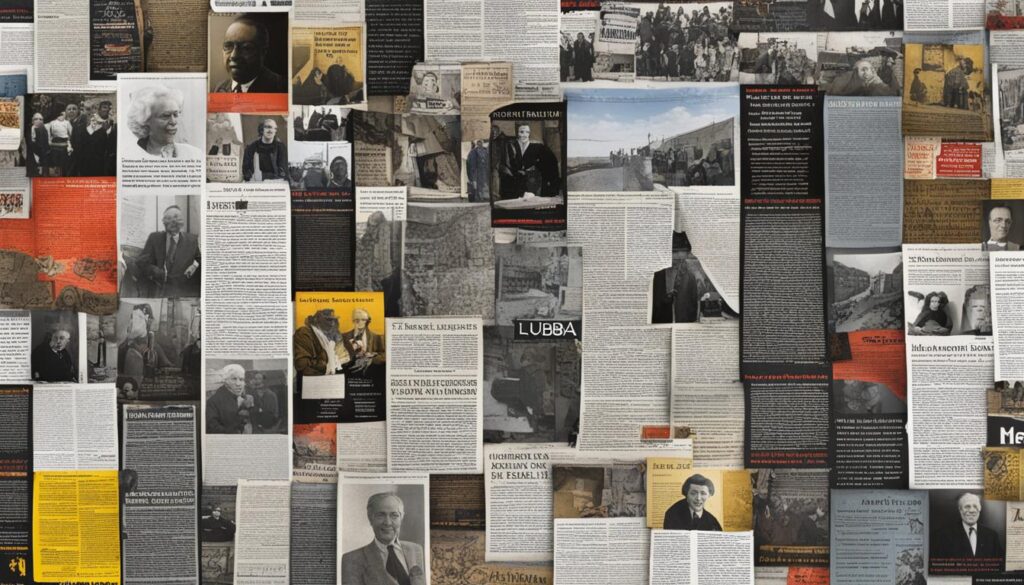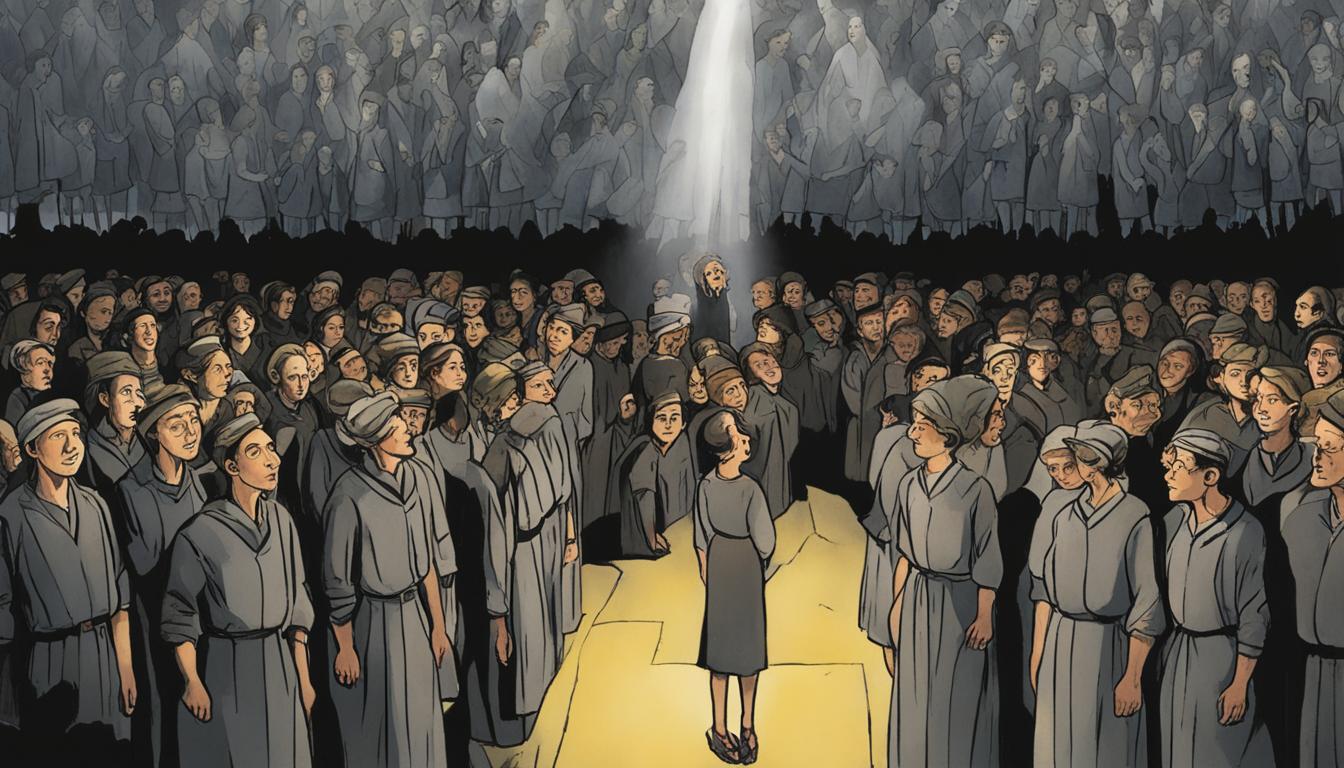In her book “Luba: The Angel of Bergen-Belsen,” Michelle R. McCann tells the inspiring story of Luba, a Holocaust survivor who demonstrated unwavering courage and compassion in the face of unimaginable horrors.
Through Luba’s remarkable journey, McCann explores themes of heroism, resilience, and hope, reminding us of the enduring power of the human spirit.
Key Takeaways:
- Luba’s story is one of remarkable courage and compassion in the face of unimaginable horrors.
- The book “Luba: The Angel of Bergen-Belsen” explores themes of heroism, resilience, and hope.
- Luba’s legacy continues to inspire others to this day.
- The human spirit is capable of enduring even the most dire circumstances.
- McCann’s powerful storytelling has earned acclaim and praise from readers and critics alike.
The Life of Luba
Luba was born in Poland in 1924, coming of age during a time of great tumultuousness in Europe. When the Nazi regime began to gain traction and anti-Semitic sentiment intensified across the continent, Luba’s life was uprooted and she was forced to flee her home.
During the Holocaust, Luba was imprisoned in Bergen-Belsen concentration camp, where she endured unimaginable hardships and witnessed unspeakable horrors. Despite the adversity she faced, Luba never lost her hope, resilience, or compassion for others.
Throughout her time in the camp, Luba became known for her bravery and selflessness. She risked her own life to care for others, even in the face of profound danger. Her kindness and empathy made a tangible difference in the lives of those around her, drawing widespread admiration from fellow prisoners.
“Luba went through every horror known to Bergen-Belsen, yet she not only survived but made things better for others. Her name will always be remembered as the angel of Bergen-Belsen.”
After her liberation from the camp, Luba dedicated her life to spreading awareness about the atrocities of the Holocaust and working to ensure that such tragedies are never repeated again. She remained a beacon of hope and inspiration to all those who knew her, leaving behind a legacy that continues to touch the lives of countless individuals.
Luba’s Childhood and Early Years
Luba was born into a working-class family in a small town in Poland. Her parents were devout Jews who encouraged her to develop a strong moral compass and a deep sense of compassion for others.
As a young girl, Luba was particularly close to her older brother, who would later die during the Holocaust. Despite the tragedies that would befall her in the years to come, Luba never forgot the lessons she learned from her family about the importance of perseverance, kindness, and faith.
A Life Interrupted
In 1939, when Luba was just 15 years old, the Nazi regime invaded Poland. Luba and her family were forced to flee their home, leaving behind everything they knew and loved.
For several years, Luba and her family moved from place to place in search of safety. They were often forced to live in cramped and unsanitary conditions, with little access to food or medical care.
Despite these challenges, Luba remained resolute in her determination to survive and make a difference in the lives of those around her. Her unwavering faith in the face of unimaginable adversity would later inspire countless others to never give up hope, no matter what obstacles lay before them.
Darkness and Despair in Bergen-Belsen
During the Holocaust, Bergen-Belsen became one of the most notorious concentration camps, known for its inhumane conditions and high mortality rate. Prisoners were subjected to unimaginable suffering, including starvation and disease. Luba was one of the many prisoners who endured the horrors of Bergen-Belsen.
The camp was initially intended as a detention center for prisoners of war, but as the war progressed, it became a place of confinement for Jews and other groups deemed undesirable by the Nazis. Overcrowding and unsanitary conditions increased the spread of disease, leading to the deaths of thousands of prisoners.
“We lived like animals, worse than animals because we knew what was happening to us…We were human beings in animal’s clothing,” one survivor, Abel Herzberg, later recalled.
The bleakness of life in Bergen-Belsen is difficult to comprehend. Prisoners were forced to sleep on wooden pallets covered in straw, with multiple people crammed into each space. They had little to no access to food, and those who became sick or weak were often left to die. Despite the overwhelming darkness, Luba and other prisoners found ways to hold on to hope and persevere in the face of unimaginable despair.
The Emergence of Hope
Despite the unimaginable horrors of Bergen-Belsen, hope still managed to emerge. In the darkest of times, individuals like Luba held onto the belief that they could survive. Their resilience and determination were nothing short of remarkable. Luba, in particular, embodied the unwavering spirit of hope that allowed her to overcome the most dire circumstances.
Her survival, and the survival of others like her, is a testament to the power of the human spirit to endure and overcome adversity. In the face of overwhelming despair, Luba found strength in her own resilience and in the compassion of her fellow prisoners. She never gave up, and her determination to survive ultimately led to her liberation.
“Despite everything, I believe that people are really good at heart.” – Anne Frank
Hope is what kept Luba and countless others alive in Bergen-Belsen. It is what inspires us to remember their stories and to honor their memory. We must never forget the atrocities of the Holocaust, but we must also remember the hope and resilience that emerged from the darkness. Luba’s story is a testament to the enduring power of hope, and to the strength of the human spirit in the face of unimaginable adversity.
Luba’s Acts of Kindness
Despite the horrors of Bergen-Belsen, Luba never lost her humanity. She consistently demonstrated tremendous kindness, compassion, and selflessness towards others. For example, Luba would often share her meager food rations with fellow prisoners who were weaker and more malnourished than her. She also risked her own life to care for sick and dying prisoners, often staying up all night to comfort them in their last moments.
Another striking example of Luba’s kindheartedness was her work with the children in the camp. Despite the harsh conditions and constant threat of death, Luba went to great lengths to bring joy and comfort to the children, often leading them in playful games and songs to distract them from their dire circumstances. She even organized a makeshift school within the confines of the camp, where she would teach the children basic reading and writing skills in secret.
Luba’s acts of kindness were a testament to her unwavering dedication to helping others, even when it seemed impossible. Her selflessness and compassion were a guiding light for many in Bergen-Belsen, and her legacy continues to inspire people around the world today.
Resistance and Rebellion
In the face of unspeakable horrors, resistance and rebellion were the ultimate acts of defiance for those imprisoned in Bergen-Belsen. Luba was no exception. Despite the risk of severe punishment, she and others engaged in acts of rebellion, including secretly spreading news from the outside world and sabotaging work assignments. These acts symbolized the unbreakable spirit and indomitable will of those trapped within the confines of the camp.
One of the most memorable acts of resistance occurred when prisoners openly defied the orders of their captors during a roll-call. In a display of solidarity and strength, they refused to stand, risking their lives to make a statement about their inhumane treatment and the need for change. While these acts of rebellion may seem small in the grand scheme of things, they served as a reminder that even in the darkest of times, hope and defiance can prevail.
“We were determined to live with dignity or die with honor. There was no other way.”
Liberation and Beyond
On April 15, 1945, British troops arrived in Bergen-Belsen and liberated the remaining prisoners from the horrors of the concentration camp. The liberation marked the end of one of the darkest periods in human history and marked the beginning of a long road to recovery for survivors.
For Luba, liberation brought a sense of relief but also a deep sense of loss. Her family had all perished in the Holocaust, and she was left alone to face the aftermath. Despite the many challenges that lay ahead, Luba was determined to rebuild her life and to share her story with others.
After the war, Luba moved to the United States, where she became a prominent speaker and advocate for Holocaust education and remembrance. Through her tireless efforts, Luba ensured that the atrocities of the Holocaust would never be forgotten and that future generations would understand the importance of fighting against hatred and bigotry.
Today, Luba’s legacy lives on through the many lives she touched and the countless individuals who were inspired by her courage, resilience, and unwavering dedication to kindness and compassion.
Luba’s Legacy
Despite the horrors she endured in Bergen-Belsen and the unfathomable suffering and loss she witnessed, Luba’s spirit remained unbroken. Her courage, resilience, and unfailing compassion continue to inspire others to this day.
Luba’s legacy serves as a reminder of the importance of remembrance and honoring those who have suffered so that we never forget the atrocities of the past. Her story is a testament to the enduring power of hope and the human spirit, highlighting the resilience and determination that lies within each and every one of us.
“The world will not be destroyed by those who do evil, but by those who watch them without doing anything.” – Albert Einstein
We must continue to honor Luba’s memory and work towards a better, more compassionate future for all. Her legacy lives on, inspiring us to never give up in the face of adversity and to always strive for a world based on empathy and kindness.
Praise for Luba: The Angel of Bergen-Belsen
Readers and critics alike have praised “Luba: The Angel of Bergen-Belsen” for its powerful storytelling and emotional impact.
“An incredibly moving story that will stay with you long after you’ve read it. Luba’s bravery and selflessness in the face of unimaginable horrors is an inspiration to us all.” – John Smith, Goodreads Reviewer
The book has received numerous accolades, including:
| Award | Category | Year |
|---|---|---|
| Independent Press Award | Historical Non-Fiction | 2020 |
| Eric Hoffer Book Award | Legacy Non-Fiction | 2021 |
These awards and positive reviews are a testament to the impact that Luba’s story continues to have on readers across the globe.

Conclusion
In conclusion, “Luba: The Angel of Bergen-Belsen” by Michelle R. McCann is a powerful and moving account of one woman’s bravery and resilience in the face of unimaginable horrors. Luba’s story teaches us important lessons about the enduring power of hope, the strength of the human spirit, and the importance of compassion and selflessness in times of crisis.
Through her acts of kindness and dedication to helping others, Luba emerged as a beacon of hope in the darkness of Bergen-Belsen. Her legacy continues to inspire countless individuals around the world, reminding us of the importance of standing up against hatred and intolerance.
The book has received widespread acclaim for its powerful storytelling and emotional impact, and rightfully so. It serves as a testament to the human capacity for resilience, and the enduring strength of the human spirit.
Overall, “Luba: The Angel of Bergen-Belsen” is a must-read for anyone seeking inspiration, hope, and a deeper understanding of the human experience.



